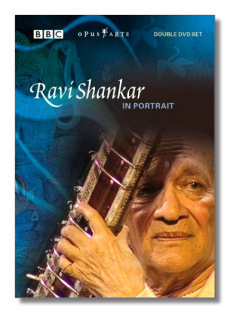
The Internet's Premier Classical Music Source
Related Links
- Latest Reviews
- More Reviews
-
By Composer
-
Collections
DVD & Blu-ray
Books
Concert Reviews
Articles/Interviews
Software
Audio
Search Amazon
Recommended Links
Site News
 DVD Review
DVD Review
Ravi Shankar

In Portrait
- Between two worlds – biographical feature filmed in India & America
- Live in concert – Raga Anandi Kalyan & Raga Rangeela Piloo
- Benares Ghat – teaching session with pupils
- The sitar & Indian music – personal introduction
Studio: Opus Arte Media Productions
BBC Opus Arte OA0853D 2 DVDs 190 mins
Ravi Shankar's name is known to all music lovers and he has been the greatest ambassador to the West for Indian Classical Music, which was relatively unknown and unappreciated in UK until the '50s, when I began to attend small concerts in London to hear great performers including the sarodist, Ali Akbar Khan, since when I have been writing about this arcane delight, whilst remaining still an ignorant devotee of this wonderful music, which requires years of study to begin to penetrate its mysteries. At a superficial level, it is easy to enjoy, and few will remain untouched by the beauty of the sitar, to see and to hear, with revealing close-ups showing exactly how it is played.
To celebrate Ravi Shankar's 80th birthday here is a delightful and moving documentary, expertly compiled and filmed, with breathtaking scenes of life in India and the West. Ravi Shankar reviews his extraordinary life with warmth and humility, commenting with members of his family around him on the scenes which pass before him and us, expressing gratitude for his good fortune and long life. We are taken through his childhood, world tours as a dancer in a troup led by his brother Uday, the glamorous high life of Paris and New York, meetings and associations with all the greatest musicians of the time and, from eighteen, intensive study with his guru Baba Allauddin Khan which led him towards emergence as the great musician in the classical tradition who is revered the world over.
Later Ravi Shankar contributed the music to Satyajit Ray's historic films, influenced musicians as diverse as Menuhin, John Coltrane and George Harrison, later retreating and withdrawing from the rock world super-stardom and taking great satisfaction in teaching pupils including his daughter Anoushka, now a sitar virtuoso in her own right. There is a short extract from one of his lessons and, to end, a short introduction to Indian music and to the sitar, with a demonstration of how they are made, followed by two Ragas played in concert in London, at Union Chapel, Islington, during the summer of 2002, the Raga Rangeela Piloo especially beautiful.
Links to PGW's earlier writings for further reading:
IMMERSION IN INDIAN MUSIC: July 1999 Indian classical music has become increasingly available in UK concerts and recordings during the last few decades.
THE RAGA GUIDE A survey of 74 Hindustani Ragas: Book with 4 CDs Nimbus NI5536-9
Copyright © 2002, Peter Grahame Woolf




















